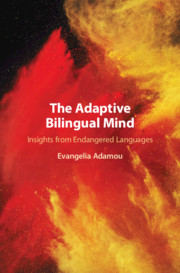Book contents
- The Adaptive Bilingual Mind
- The Adaptive Bilingual Mind
- Copyright page
- Contents
- Figures
- Tables
- Preface
- Acknowledgements
- Abbreviations
- Introduction and Methods
- Part I Do Bilinguals Maintain Language-Specific Conceptualizations?
- Part II Are Bilinguals Confronted with High Cognitive Costs?
- 7 State of the Art
- 8 Cognitive Costs in Atypical Forms of Codeswitching
- 9 Reduction of Alternatives in Language
- Part III Conclusions
- Glossary
- Appendix Research Participant Consent Form
- References
- Index
9 - Reduction of Alternatives in Language
from Part II - Are Bilinguals Confronted with High Cognitive Costs?
Published online by Cambridge University Press: 23 April 2021
- The Adaptive Bilingual Mind
- The Adaptive Bilingual Mind
- Copyright page
- Contents
- Figures
- Tables
- Preface
- Acknowledgements
- Abbreviations
- Introduction and Methods
- Part I Do Bilinguals Maintain Language-Specific Conceptualizations?
- Part II Are Bilinguals Confronted with High Cognitive Costs?
- 7 State of the Art
- 8 Cognitive Costs in Atypical Forms of Codeswitching
- 9 Reduction of Alternatives in Language
- Part III Conclusions
- Glossary
- Appendix Research Participant Consent Form
- References
- Index
Summary
Romance languages are well known for having two conceptualizations of being, expressed by distinct linguistic means; this is the case for Spanish, Catalan, and Portuguese. In contemporary Spanish varieties, in particular, there are two copulas meaning ‘to be’ with largely similar uses: ser ‘to be’, deriving from two Latin verbs, esse, ‘to exist’, and sedere, ‘to be seated’, and estar, ‘to be’, from the Latin verb stāre, ‘to stand’, which developed into auxiliary verbs (with past participles) and copular verbs (with attributive adjectives). It is in Medieval Spanish that ser and estar begun to converge, with texts from the twelfth century illustrating uses of estar in contexts that were previously covered by ser (see Arias, 2005). The expansion of estar is still ongoing in modern Spanish varieties, and is particularly dynamic in Spanish varieties spoken in Latin America.
- Type
- Chapter
- Information
- The Adaptive Bilingual MindInsights from Endangered Languages, pp. 140 - 162Publisher: Cambridge University PressPrint publication year: 2021



